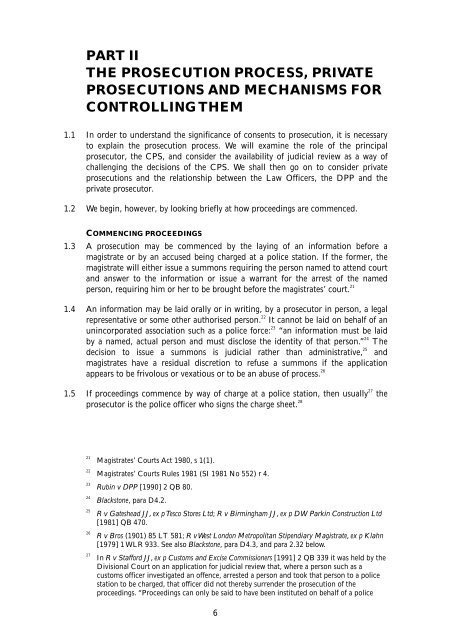cp149 Consents to Prosecution consultation - Law Commission
cp149 Consents to Prosecution consultation - Law Commission
cp149 Consents to Prosecution consultation - Law Commission
Create successful ePaper yourself
Turn your PDF publications into a flip-book with our unique Google optimized e-Paper software.
PART II<br />
THE PROSECUTION PROCESS, PRIVATE<br />
PROSECUTIONS AND MECHANISMS FOR<br />
CONTROLLING THEM<br />
1.1 In order <strong>to</strong> understand the significance of consents <strong>to</strong> prosecution, it is necessary<br />
<strong>to</strong> explain the prosecution process. We will examine the role of the principal<br />
prosecu<strong>to</strong>r, the CPS, and consider the availability of judicial review as a way of<br />
challenging the decisions of the CPS. We shall then go on <strong>to</strong> consider private<br />
prosecutions and the relationship between the <strong>Law</strong> Officers, the DPP and the<br />
private prosecu<strong>to</strong>r.<br />
1.2 We begin, however, by looking briefly at how proceedings are commenced.<br />
COMMENCING PROCEEDINGS<br />
1.3 A prosecution may be commenced by the laying of an information before a<br />
magistrate or by an accused being charged at a police station. If the former, the<br />
magistrate will either issue a summons requiring the person named <strong>to</strong> attend court<br />
and answer <strong>to</strong> the information or issue a warrant for the arrest of the named<br />
person, requiring him or her <strong>to</strong> be brought before the magistrates’ court. 21<br />
1.4 An information may be laid orally or in writing, by a prosecu<strong>to</strong>r in person, a legal<br />
representative or some other authorised person. 22<br />
It cannot be laid on behalf of an<br />
unincorporated association such as a police force: 23<br />
“an information must be laid<br />
by a named, actual person and must disclose the identity of that person.” 24<br />
The<br />
decision <strong>to</strong> issue a summons is judicial rather than administrative, 25<br />
and<br />
magistrates have a residual discretion <strong>to</strong> refuse a summons if the application<br />
appears <strong>to</strong> be frivolous or vexatious or <strong>to</strong> be an abuse of process. 26<br />
1.5 If proceedings commence by way of charge at a police station, then usually 27<br />
the<br />
prosecu<strong>to</strong>r is the police officer who signs the charge sheet. 28<br />
21 Magistrates’ Courts Act 1980, s 1(1).<br />
22 Magistrates’ Courts Rules 1981 (SI 1981 No 552) r 4.<br />
23 Rubin v DPP [1990] 2 QB 80.<br />
24 Blacks<strong>to</strong>ne, para D4.2.<br />
25 R v Gateshead JJ, ex p Tesco S<strong>to</strong>res Ltd; R v Birmingham JJ, ex p D W Parkin Construction Ltd<br />
[1981] QB 470.<br />
26 R v Bros (1901) 85 LT 581; R v West London Metropolitan Stipendiary Magistrate, ex p Klahn<br />
[1979] 1 WLR 933. See also Blacks<strong>to</strong>ne, para D4.3, and para 2.32 below.<br />
27 In R v Stafford JJ, ex p Cus<strong>to</strong>ms and Excise <strong>Commission</strong>ers [1991] 2 QB 339 it was held by the<br />
Divisional Court on an application for judicial review that, where a person such as a<br />
cus<strong>to</strong>ms officer investigated an offence, arrested a person and <strong>to</strong>ok that person <strong>to</strong> a police<br />
station <strong>to</strong> be charged, that officer did not thereby surrender the prosecution of the<br />
proceedings. “Proceedings can only be said <strong>to</strong> have been instituted on behalf of a police<br />
6
















